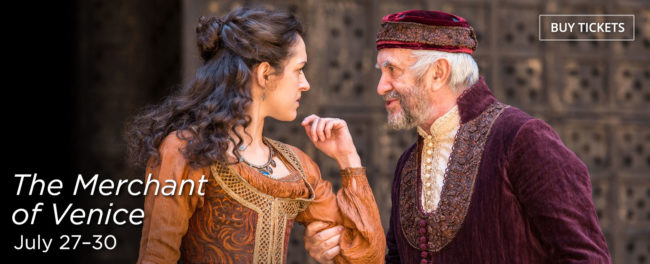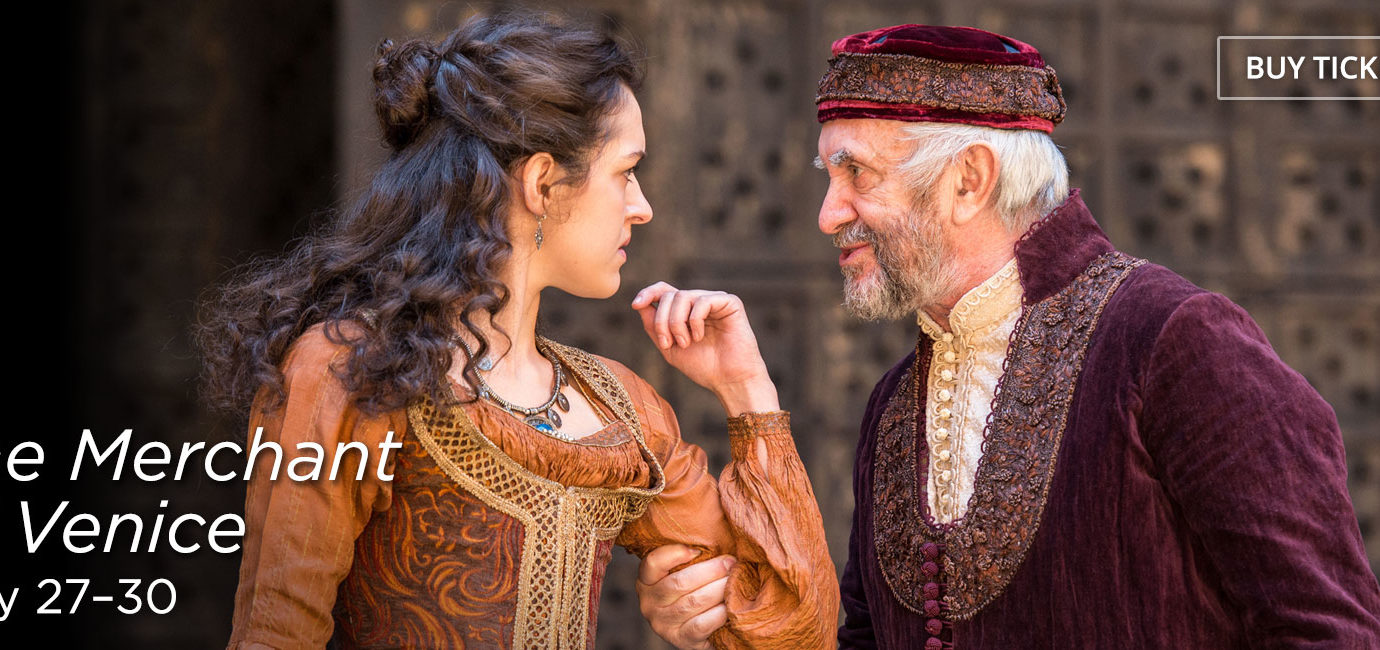Hold the world but as the world, where every man must play a part. The actor his character, the characters their plots, and to you— dear audience— the part of enchanted for an evening’s merriment and mirth masked in the enthralling guise of the Bard’s tragicomedy The Merchant of Venice. For a whirlwind three performance engagement in The Eisenhower Theatre of The John F. Kennedy Center for Performing Arts, Shakespeare’s Globe on Tour doth set down this remarkable expression of performance before the eager eyes of an audience. Directed by Jonathan Munby, this exceptionally articulated and flawlessly nuanced vision of religious intolerance blended among the humors of love and playful deceit finds its footing in an immersion of a Shakespearean experience, which can only properly be referred to as a Shakespeareance.
Rife sounds of shallow foppery, more accurately read as the festive sounds of foolish merriment traverse beyond the aural palette and affect themselves to the show’s scenic scape and overall aesthetic as designed by Mike Britton. Supported fully by a stirring score, uniquely crafted by Composer Jules Maxwell and augmented by the Sound Designs of Christopher Shutt, Britton’s design is ensconced in the labors of celebratory glee. A revel in full swing at the peaked season’s evening of Carnivale in Venice is thrust upon the audience visually, aurally, and emotionally from the moment the Musicians (Jeremy Avis, Lea Cornthwaite, Harry Napier, and Dai Pritchard) make haste of their instruments—be they actual or la voce— and play on with a mighty rhythm to engage not only the players but the audience in the carousal and bacchanal that deceitfully sets the play on its road to unadulterated comedy. Maxwell’s composition under this fine quartet of musicians is featured frequently throughout the performance, utilized to abruptly move one scene to the next and to provide emotionally charged aural cue cards to the audience.
Classically inspired Venetian garb stands resplendent against the stark setting of Britton’s show design. Praiseworthy costumes of note include the bedecked decadence seen on both the Prince of Arragon and of Morocco, as well as the gloriously patterned gowns for the ladies Portia, Nerissa, and Jessica near the time of their nuptials. This juxtaposition of tasteful threads against barren backdrops is beautifully jarring and pulls the focus to the way the performers move about under the smooth Choreography of Lucy Hind. Engaged in an almost cinematic fashion, Hind moves individuals in and out of view for moments of description— whenever one man speaks of the woman he loves— letting these lovely ladies drift in and out of the eye of their beholder as if in a vivid dream.

Hind’s choreography matches the overall pacing and pulse of Director Jonathan Munby’s show. The framework and religious contextualization which surrounds the show’s final scene, in addition to the roaring celebratory opening sequence serve as brilliant conceptual bookends to bind the play in place. Munby’s brutal show of the play’s end— left enigmatically unmentioned for those unfamiliar— which is often implied or read out but seldom if at all represented visually, is a raw and harrowing moment that tempestuously overturns the play’s natural comedic inclination as it draws to conclusion. This, among dozens of other nuanced details and fleshed out moments make the production stellar.
Coming to mind most readily in the aforementioned vein of directorial choices is the way in which side-character Lancelot Gobbo (Stefan Adegbola) is handled. With a gregariously social wit bouncing from his core the way rubber balls do when they smack pavement, Adegbola is the epitome of the foolish servant and the perfect fit for obliterating the fourth wall. Tickling the audience into sheer stitches of maddened laughter with his “conscience versus fiend” scene, Adegbola’s lively entertaining factor makes Shakespeare literally accessible in every sense of the word. Even without the audience to play with, his performance is of the highest humors and cajoles well both his former and future masters with his nonsense.
The prince of fools can be surpassed in his comic efforts in this production only by authentic princes, of Arragon (Christopher Logan) and of Morocco (Giles Terera) respectively. Logan and Terera are momentary plot hinges that carry forth the love story of Portia and Bassanio but are so physically animated in their delivery— and in Logan’s case so frighteningly flamboyant and possessed of an outrageous accent— that they feel to be an integral part of the story, making the casket selection scenes some of the most memorable in the production. Both Logan and Terera have wildly expressive bodies, with exaggerated gestures that ripen the comedic overtones that their characters present to the situation at hand.
Solanio (Raj Bajaj) and Salarino (Brian Martin) though pared back significantly from the heightened humorous experience of the princes, find their own moments in which to reap the benefits of the comedy. This happens most readily when Bajaj delivers the infamous mockery of Shylock in the “my daughter, my ducats!” bit. The pair fall in step thick as thieves among the trio of lovers, who in this production move about as true brothers in arms, each devoted to their own personal pursuit of love while simultaneously supporting that of their mates.
Gratiano (Jolyon Coy) and Lorenzo (Andy Apollo) tumble unceremoniously into existence quite early on, appearing as a carousingly soused duo with Coy’s character being the less able on his feet of the two. Delivering their initial congress like the wit-wizened Shakespearean versions of Jay and Silent Bob, with Coy doing all of the barking— and growling to much comedic effect— the pair are noted from the beginning for their silliness, and although they each find striking moments of sincerity once besotted to members of the opposite sex, their comic origins reprise frequently throughout their amorous adventures. Apollo, being the more reverent of the two, approaches his character’s relationship with Jessica (Phoebe Pryce) with the noblest of intentions and the most innocent of lover’s feelings.
Phoebe Pryce gives Jessica a much needed depth, making her more than a side dish of romantic entanglement when it comes to Lorenzo. Under Munby’s direction the bitter relationship between Jessica and her father is more deeply excavated with Pryce unearthing layers of Jessica’s turmoil and mixed emotions in the process. Honing a sense of earnest indecision, empathy pours from Pryce as Jessica transitions through the production, taken the road less traveled of defiance to reach joy and end in sorrow rather than the other way round.
Holding the other two female roles in their esteemed hands, Rachel Pickup— as pried Portia— and Dorothea Myer-Bennett— as her hand-maid— carry their own when it comes to the men of the show. There is something reserved and aloof in Pickup’s portrayal of Portia, particularly when it comes to dismissing her suitors, that melts away like morning mist upon seeing the first light of sun. Herein sunlight is the bright and radiant Bassanio (Dan Fredenburgh), who finds himself the center of both major plot lines in the story. Munby’s casting appropriate of setting Fredenburgh and Pickup, both seasoned of talent and face, to the roles is smart, fully allowing for many of their exchanges during the casket scene to land clearly. Their chemistry is clear and in earnest with one another, especially when things get tricky towards the show’s conclusion.
Fredenburgh, whose presence is felt strongest when he is merely observing some of the overripe conflicts between Antonio (Dominic Mafham) and Shylock (Jonathan Pryce), is an actor who relies heavily on his facial expressions, particularly when responding without words to the scenes that unfold around him. His reactionary tendencies— be they highly hilarious or gravely severe— are as intense to behold as the words that are spinning around him between the others on stage. This is true of a great many scenes but none so worthy of praise as the recovery of the duping toward the show’s ending and the initial showdown of terms between the merchant and money lender.
Dominic Mafham’s portrayal of Antonio arrives to the hearts and souls of the audience in earnest. Guided in a new light by Munby’s vision, there is an unrequited ardor that strikes a fervent blow to every action that follows throughout the course of the production, and delivered at the hands of Mafham is wondrous to behold. The characters atrociously uncouth behavior takes root in both hardened voice and stalwart physicality when it comes to the ridicule and prejudice witnessed on the streets between Antonio and Shylock.
As the show’s leading man, Jonathan Pryce is a tour du force; the audience clings to his every word. A strikingly present man upon the stage, every word Pryce speaks feels as if it has been breathed into existence in that moment and never previously uttered. Entering the debate of terms, first with Bassanio and then with Antonio is never a forgone conclusion for Pryce, which is what makes the entire scene so riveting even for those who know well how the story goes. Emblazoned with passion, his profound “hath not a Jew eyes” monologue is delivered with such harrowing intensity that it is difficult to swallow. Churning the emotional tables over themselves in an unruly tempest, Pryce pulls the audience through a war of pathos within himself making those watching delightfully uncertain as to whether or not he is to be empathized with or loathed.
Sensational and sure to light a fire in the heart if not the mind and soul as well, this visiting production is not to be missed this summer.
Running Time: 2 hours and 50 minutes with one intermission
The Merchant of Venice plays through July 30, 2016 in the Eisenhower Theatre of The John F. Kennedy Center for Performing Arts— 2700 F Street NW in Washington, DC. For tickets call the box office at (202) 467-4600 or purchase them online.

